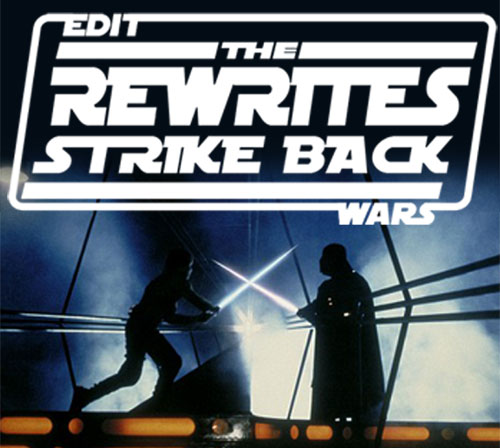Even though I am a writer by nature, I am an editor by trade. You might think that means my writing is perfect the first time round, but that's not true. Sure, my English is probably fine, but it's hard to see what is wrong with something you wrote. It's your baby; it's perfect! Every story, poem, article, whatever it is you have written, needs another set of eyes on it to make it better. Hopefully that extra set of eyes can see what you can't and can guide you in improving it. (Please have it edited before you submit it to a publisher! You want every advantage you can have.)
Not all editors were created equal. If you can, try to get a sample of the editor's work before you pay them anything. It's my personal practice to send half the manuscript back to the author before I ask for what they owe me, and when I get the payment, I give them the second half. That way, they know they are paying for a quality scrubbing and I can be sure I am getting paid.
 |
| This is one of my favorite memes ever. |
Getting a manuscript back from an editor can be one of the most discouraging moments ever. You'll suddenly see just how terrible a writer you are and wonder whether the project is even worth it. Okay, you might wonder those things. I'm not you, so I don't really know. I just know that sometimes that moment makes me want to cry.
A good editor will rip your piece apart. That's the truth of it. But they should also mix compliments and jokes in with their critique. This serves to give you some confidence and also makes you feel like the project really isn't a lost cause. Plus, anything that makes you smile in that moment is greatly appreciated.
If the compliments and jokes outnumber the actual edits, you need a better editor, because they aren't doing their job correctly. You are not paying them to make you feel warm and fuzzy inside.
Some sample comments, both edits and not, that I have made before, to give you an idea of what I mean:
I’m going to be blunt and say this sounds stupid. Try to find a different lead-in, maybe consider using an em dash.
Well, that’s a conceited thought.
What is the newbie doing, and was he at last week’s meeting?
Stereotypical
You’ve got romantic undertones going on. FYI.
Well done in showing, not telling, that her existence has been wiped out. It leaves two questions: Why is the stone for her grave still there, and why do the ghosts remember her?
This drops your audience's age from about 6 to about 3
You are making this kid symbolic for every kid; he is not unique in any way. Make him a person with an actual character, even if he only appears here. Characters who are stereotypical are lazy characters.
Oh, please. He knows she’s talking to him. This is just him being rude.When I edit, I tend to make the following types of comments:
1. Corrections/edits (all are suggestions; note that everything an editor says is always a suggestion)
2. Reactions to the story (so the author can gauge how a reader is responding and adjust if desired)
3. FYIs (meaning, I tell the writer what they just did in case they didn't realize it and don't want to be doing that)
4. Questions (meant to urge the author to clarify or add things)
5. Compliments
6. Jokes (sometimes because a correction needs to be made that was obvious and funny, sometimes a reaction to what the characters are doing)
I do not always give suggestions for how to fix something. Depending on the writer, that can be appreciated or not. When I don't give a suggestion, it's usually because I believe this is the author's work and my solution would make it sound too much like me instead of them.
 This post would be incomplete without me saying that an editor should always treat the work as yours. The writer has the final say, because it is their work and their name is the prominent one on it should it get published. An editor should work with a writer just like a coach works with an athlete. No editor should belittle you or your piece and still get paid the full amount. This is why I suggest getting a sample first, because that should show you what sort of editor the person is. The writer is the athlete, the editor is the coach, and they work together to serve the reader. The reader is the most important part of this equation. Never forget that.
This post would be incomplete without me saying that an editor should always treat the work as yours. The writer has the final say, because it is their work and their name is the prominent one on it should it get published. An editor should work with a writer just like a coach works with an athlete. No editor should belittle you or your piece and still get paid the full amount. This is why I suggest getting a sample first, because that should show you what sort of editor the person is. The writer is the athlete, the editor is the coach, and they work together to serve the reader. The reader is the most important part of this equation. Never forget that.I'll end this post with a plug for myself as an editor. If you want me to edit your piece, leave a comment and I'll get back to you.
May the Force be with you, and happy September!

No comments:
Post a Comment